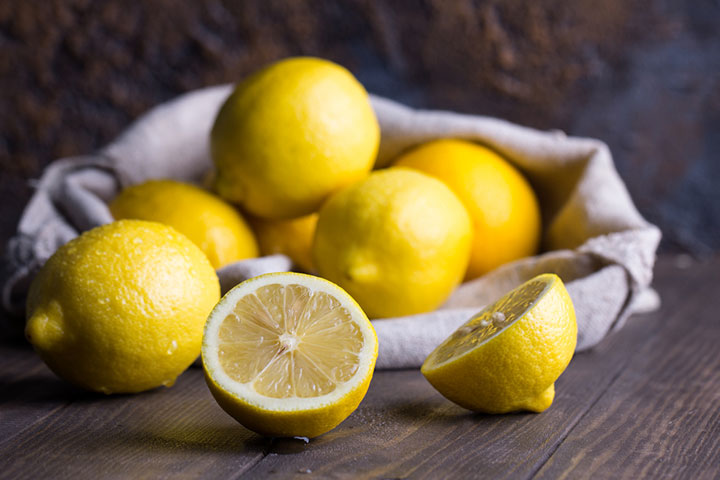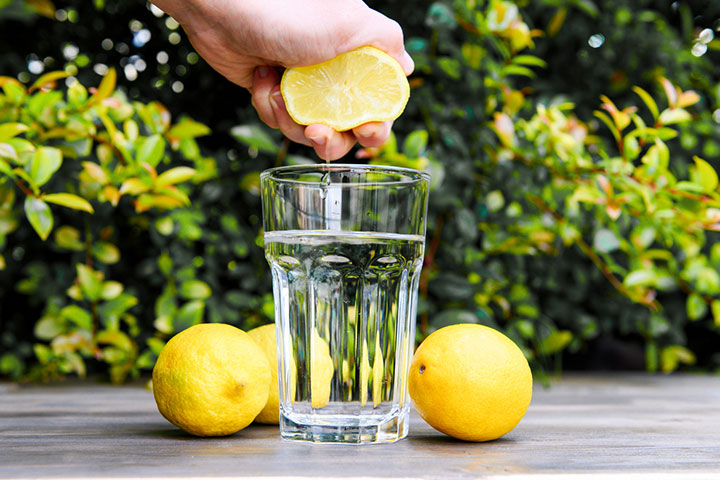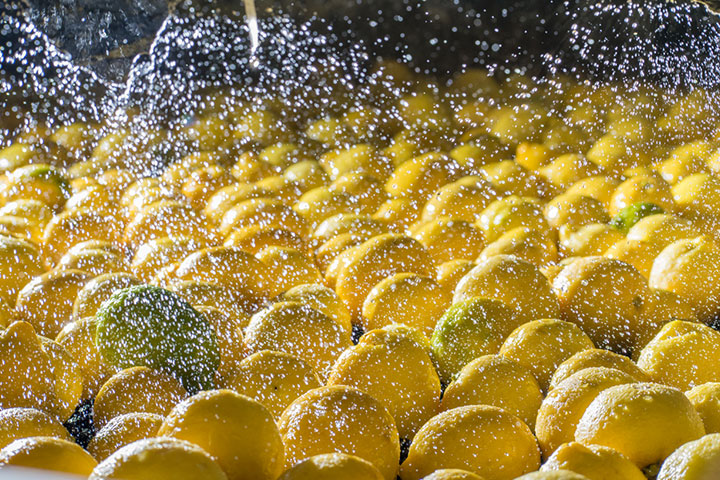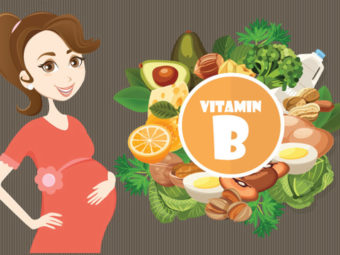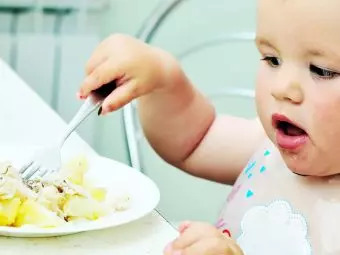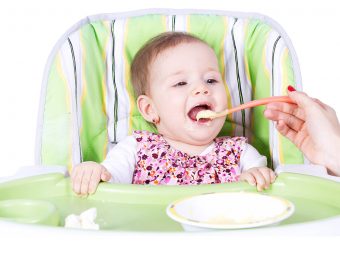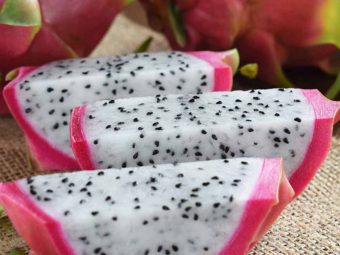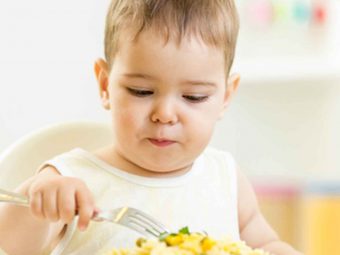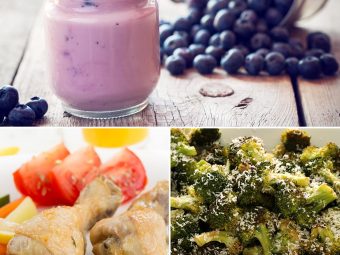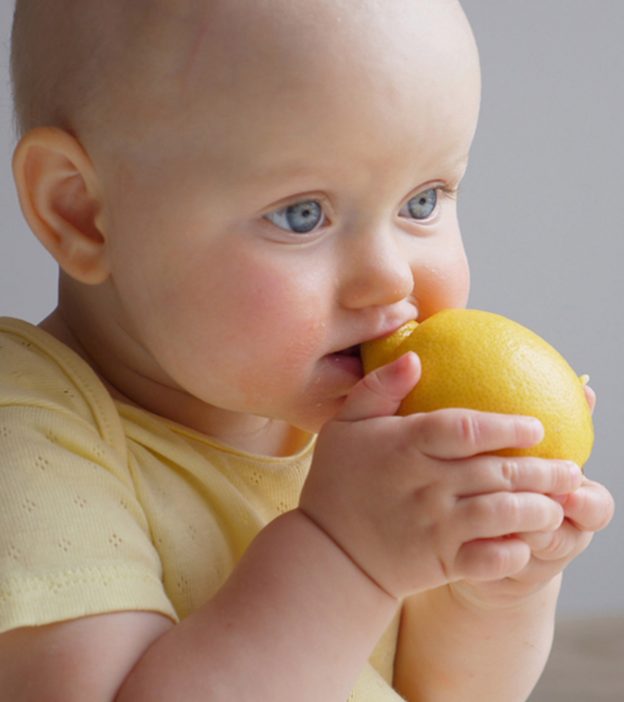
Image: ShutterStock
Lemon is a citrus fruit and a vital vitamin C source. It is known for its refreshing flavor and scent. Due to the benefits of lemon for babies, parents consider adding it as a supplementary component while preparing their drinks or foods, but some doubt whether it is safe enough to do so.
Lemon contains high quantities ofbioactive compoundsiXMolecules in plants and some foods with antioxidant properties and health-promoting effects.and is considered a healthy option in several home remedies.Including lemon in your regular diet could boost yourimmune system, make your skin healthy, and enhance iron absorption.
This post shares some details about the health benefits, safety, and appropriate ways to include lemon in your baby’s diet.
When Can Babies Have Lemons?
Image: IStock
It is generally recommended to introduce citrus fruits to babies after about six months of age(1)(2). You may consider adding lemons after the age of eight months, which is when other citrus fruits, such as oranges, are included in a baby’s weaning diet(3).
Some parents consider waiting up to the age of 12 months due to the high acidity of citrus fruits(4). You may consult a pediatrician to know the best age to introduce lemons to your little one.
Though rare, allergy to lemons exists(5). However, according to the American Academy of Pediatrics, there is no reason to delay feeding foods considered allergens(6).These foods can be added to the baby’s diet with other non-allergenic foods.But if your baby tends to display an allergic reaction or intolerance to new foods, is allergic to other citrus fruits, or has a family history of allergies, then do not introduce lemons during fruit introduction, without consulting a doctor.
Nutritional Value Of Lemon
Lemons promote baby nutrition by providing several essential nutrients, such as vitamin C, minerals, dietary fibers, andphytochemicalsiXBioactive compounds found in plant-based foods that act as antioxidants and have antimicrobial effects., such ascarotenoidsiXColored pigments found in plant-based foods that act as a precursor in the synthesis of vitamin A and protect cells from damage.andphenolic acidsiXAromatic compounds found in plant products believed to have antioxidant, anti-inflammatory, and anticancer properties.(7)(8).
One fluid ounce (31g) of freshly squeezed, 100 percent lemon juice offers the following nutrients in comparison to the daily recommended intake for each nutrient(9)(10)(11)(12).
| Name | Amount | RDA (7-12months) |
|---|---|---|
| 水 | 28.6g | – |
| Carbohydrate, by difference | 2.14g | – |
| Fiber, total dietary | 0.093g | – |
| Magnesium, Mg | 1.86mg | 60 |
| Phosphorus, P | 2.48mg | 275 (AI)* |
| Potassium, K | 31.9mg | 700 |
| Vitamin C, total ascorbic acid | 12mg | 35 |
| Folate, total | 6.2µg | 80 (AI)* |
*AI = Adequate intake – nutrient level considered to ensure nutritional adequacy
Sources: U.S. Department of Agriculture, World Health Organization, and Oregon State University
Possible Health Benefits Of Lemon For Babies And Toddlers
Here are some significant health benefits of lemon juice a baby could reap over time.
- Provides hydration:One fluid ounce of fresh lemon juice can give 28.6g of water with essential vitamins and minerals, thus having hydrating effects(13). You can give diluted lemon juice in small quantities to your baby/ toddler.
- Boosts immunity:Lemon juice is rich in vitamin C, citric acid, and bioactive compounds, such as eriocitrin, that are considered good for immunity(14).Besides, it possesses antimicrobial and anti-inflammatory properties that can benefit the immune system(13).
- Enhances digestion:When consumed in small amounts, D-limonene found in lemon juice could increasegastric motilityiXThe muscular movement that helps mix and push food and fluids through the stomach., neutralize stomach acids, and reduce indigestion symptoms, such as nausea and gastric reflux(13). There are several home remedies where diluted lemon juice is used to boost a baby ortoddler’s digestion.
- Increases iron absorption:Adding vitamin C-rich lemon juice to non-heme baby food,like spinachand pulses, can enhance iron bioavailability(15). Babies on a solid diet need adequate iron to boost neurological development and a healthy circulatory system(16)(17).
- Relieves cold and flu:研究表明,柠檬抗病毒正确ties and could reduce mucus andphlegmiXThick mucus secreted from the respiratory tract..A cup of warm water with lemon juice may help alleviate cold andflu symptoms(13)(18).
 Quick fact
Quick factImage: IStock
Possible Side Effects Of Lemon For Babies And Toddlers
Avoid feeding undiluted lemon juice to babies and toddlers. Lemon may not have any side effects in a healthy child if taken in small quantities diluted in water, or in some recipes. Otherwise, below are some potential side effects of lemon consumption among babies and toddlers.
- Gastrointestinal disturbances: Lemon juice is acidic and may aggravate gastrointestinal issues, such asgastroesophageal refluxiXA condition in which the stomach acids leak back into the esophagus (food pipe) from the stomach., in sensitive babies and toddlers.Therefore, feed only diluted lemon juice to babies as part of some recipe. If the baby seems uncomfortable, discontinue its use and try after some weeks.
- Tooth decay:Frequent and prolonged exposure to citric acid can cause enamel erosion making teeth susceptible to decay in the long run(19)(20). Rinse your toddler’s mouth with plain water every time they consume diluted lemon juice.
Image: IStock
- Citrus allergy:Although rare, citrus allergy is possible. Babies with a family history of pollen and grass allergies may have a risk of developing citrus allergies(21)(22). A baby with such an allergy can display an allergic reaction on the consumption of lemon juice or on the touch of a lemon peel.
Some babies may display mild oral rash or gastric disturbances on the first consumption of lemons. These are not signs of allergy. Once the body adapts to the new food, these disturbances will be gone. However, if the baby displays signs of severe intolerance or allergy, then stop feeding lemons and consult a pediatrician.
Useful Tips To Buy And Store Lemons
Here are some tips for the proper selection and storage of lemon.
Selection tips
- Pick medium-sized, plump lemons with clean, smooth, firm, and shiny skin. Plump lemons are juicier.
- Discard lemons that look squishy and spongy and have green, black, or white molds.
- Do not pick lemons with wrinkled skin as they are likely to be aged and have less juice.
Storage tips
- As you get lemons home, clean them under cold, running water to remove soil, dust, and dirt.
Image: IStock
- Pat dry with a clean cloth and store in a loose paper bag at room temperature, away from the sunlight for up to a week.
- Refrigerate in a zip-lock pouch between 4-10°C (39-50°F) to store lemons for longer.
- Avoid storing cut lemons as much as possible. If you do, either wrap the lemon in cling foil or store it in an airtight container for no more than three days.
Ways To Include Lemon In The Baby’s Diet
You can add lemon to your baby and toddler’s diet in several ways.
- Add a small quantity (no more than a squirt) of fresh lemon juice diluted in water to pureed and mashed homemade baby food. It can aid in introducing new flavors to otherwise bland recipes.
- 2. If lemon juice suits the baby, add diluted lemon juice to savory recipes, such as curries, soups,and porridgesfor a sour taste.
- Prepare salads or boiled, roasted, or baked vegetable dressings with lemon juice for toddlers.
- Add lemon to plain water to prepare homemade lemonade for toddlers (recipe given below).
- Use lemon juice and lemon zest to prepare drool-worthy desserts such as a lemon bar, lemon cake, lemon pudding, and lemon tart.
Image: IStock
You can also use lemon juice to marinate foods, such as meat and vegetables, and prepare tasty grilled finger foods.
 Quick tip
Quick tipHomemade Lemonade Recipe
Commercial lemonade contains refined sugar and additives. To avoid these, you can prepare homemade lemonade for children above one year of age. Do not serve more than four fluid ounces (120ml) per day(23).
Image: Shutterstock
Here is a simple homemade lemonade recipe that you can try.
You will need:
- ½ tbsp freshly squeezed lemon juice
- oz. (120ml) plain water
- ½ tsp mint leaves (finely chopped)
- ½ tsp jaggery powder/ brown sugar
How to:
- Mix all the ingredients in a cup or glass. Ensure there are no lumps.
- Serve immediately or chill in the refrigerator for five minutes before serving.
Frequently Asked Questions
1. Are lemons high in vitamin K?
Lemons are not a rich source of vitamin K. Some foods that are rich in vitamin K are(24):
- Spinach
- Broccoli
- Lettuce
- Kale
2. Is lemon good for the kidneys?
是的。众所周知柠檬中的柠檬酸有助于再保险duce the risk of kidney stones(25). Thus, having a glass of lemon juice every morning can be beneficial.
3. What alternative citrus fruits can be given to babies if they do not like lemon?
If your baby doesn’t like lemon, you may offer alternative citrus fruits such as oranges, mandarins, or clementines. These fruits are sweeter and less acidic, potentially more appealing to your baby.
4. How can parents determine if their baby is allergic to lemon?
Parents may determine if their baby is allergic to lemon by observing any adverse reactions that occur shortly after consuming or being exposed to lemon. If they notice any unusual symptoms or signs of an allergic reaction, they should consult a healthcare professional for a proper diagnosis and guidance.
5. Should parents take any precautions when giving their baby lemons, such as avoiding certain medications or foods?
When giving their baby lemon, parents may want to exercise caution regarding potential medication interactions, consider the baby’s sensitivity to acidity, and be aware of any citrus allergies in the family. Ensure no seeds are in the lemon, as they are a choking hazard. Wash the lemon well before giving a wedge to the child.
虽然柠檬清新的品味e and is a nutritious fruit, its citrusy nature might seem concerning to parents while introducing it to newborns. Hence, consult a pediatrician to understand the pros and cons of lemons for babies. Initially, you may start by feeding them diluted lemon juice. To enhance their taste, you may also add a spoon of the juice to bland porridges, soups, and boiled vegetables to enhance the flavor. After the baby’s first intake of lemon, follow the three/five-day rule to note any intolerances towards the fruit. If they show any signs of an allergy, discontinue its use and consult your medical advisor for prompt medical attention.
Infographic: Lemon Alternatives With Similar Vitamin C Content
Lemon is an essential ingredient in your baby’s diet. But different situations, such as age and certain underlying conditions, may prevent them from consuming citrus fruits. If this is the case with your baby, you can explore other options to feed your baby to provide them the necessary vitamin C without compromising their health.

Illustration: Momjunction Design Team
Get high-quality PDF version by clicking below.
Download Infographic
Key Pointers
- Lemons are considered a rich source of antioxidants and vitamins, especially vitamin C.
- They provide hydration, improve digestion and help relieve cold and flu.
- Too much lemon can also induce citrus allergy or gastrointestinal disturbances.
References:
2.Starting Solid Foods; Healthy Children; AAP
3.Feeding Your Baby the First 12 Months; University of Rochester
4. Bellows, A. Clark, and R. Moore,Introducing Solid Foods to Infants; Colorado State University
5. Bourrier and C. Pereira,Allergy to citrus juice; NCBI
6.AAP Clinical Report Highlights Early Introduction of Peanut-based Foods to Prevent Allergies; American Academy of Pediatrics
7. Yoji Kato et al.;Effect on Blood Pressure of Daily Lemon Ingestion and Walking; NCBI
8. Marta Klimek-Szczykutowicz et al.;柠檬(柠檬)现象Ch的审查emistry, Pharmacological Properties, Applications in the Modern Pharmaceutical, Food, and Cosmetics Industries, and Biotechnological Studies; NCBI
9.Lemon juice, 100%, freshly squeezed, FDC ID: 786573; Fooddata Central; USDA
10.Feeding and nutrition of infants and young children; WHO
11.Phosphorus; Oregon State University
12.Folate; Oregon State University
13. Mahendra Pal;Lemon: A Versatile Fruit of Multiple Uses; Researchgate
14. Omar M.E. Abdel-Salam et al.;Citric Acid Effects on Brain and Liver Oxidative Stress in Lipopolysaccharide-Treated Mice; NCBI
15.The Regulation of Dietary Iron Bioavailability by Vitamin C: A Systematic Review and Meta-Analysis; Cambridge Core
16.Iron; Infant And Toddler Nutrition; CDC
17.Iron; Breastfeeding; CDC
18. Tamara Qudah et al.;Lemon as a source of functional and medicinal ingredient: A review; Researchgate
19. Abhishek Ghosh et al.;Nutrition and Oral Health; Researchgate
20.Top 9 Foods That Damage Your Teeth; American Dental Association
21.Citric Acid And Citrus Allergy; American Academy of Allergy, Asthma & Immunology
22. Rosa Anna Iorio et al.;Citrus Allergy from Pollen to Clinical Symptoms; NCBI
23.Where We Stand: Fruit Juice; American Academy of Pediatrics
24.Warfarin, your diet, and vitamin K foods; University of Iowa Hospitals and Clinics
25.Is lemon juice good for chronic kidney disease?; National Kidney Foundation





